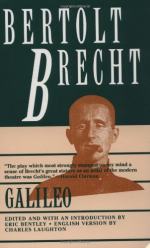|
This section contains 485 words (approx. 2 pages at 400 words per page) |

|
Galileo Summary & Study Guide Description
Galileo Summary & Study Guide includes comprehensive information and analysis to help you understand the book. This study guide contains the following sections:
This detailed literature summary also contains Topics for Discussion and a Free Quiz on Galileo by Bertolt Brecht.
Galileo by Bertolt Brecht is a short history play about the scientist and astronomer Galileo Galilei. It charts Galileo's later years, when his experiments with telescopes and development of evidence for a heliocentric model of the solar system threatened the Church, resulting in Galileo's inquisition and his eventual recantation of his scientific findings.
Middle-aged Galileo, already a famed scientist living in Venice, is in his study when he receives a geocentric model of the universe, geocentrism being the long-accepted theory about the cosmos and one Galileo knows is not true. Galileo shows Andrea, son of his housekeeper, how the earth circles the sun even though to the eyes it appears that the sun is moving through the sky. Ludovico, a student, arrives to study under Galileo. He tells Galileo about a new device, the telescope, that is sweeping Europe but which has not arrived to Italy. Priuli, a curator, arrives to inform Galileo that the university will not offer Galileo a much-needed honorarium (money); Galileo must prove his worth by inventing something useful.
Galileo takes the idea of the telescope and presents it as his own invention to the Venetian Navy. The Senators of Venice all approve, and Galileo gets his honorarium after all due to the telescope.
Later, using an improved telescope, Galileo makes discoveries about the moon and the rotation of the stars. Most importantly, he notices that the moons of Jupiter orbit that planet. This shatters the geocentric model of the universe; heavenly bodies are not supposed to orbit but instead stay fixed in a series of glass spheres.
In Florence, Galileo and his theories meet resistance. No members of the court will dare look through his telescope. The court decides to seek the opinion of Rome's preeminent astronomer, Christopher Clavius, as to Galileo's heliocentric evidence. In Rome, as church members ridicule Galileo, Clavius emerges and states that Galileo's evidence is sound.
Galileo is thereafter officially warned against pursuing astronomy by two Cardinals, Bellarmin and Barberini. Galileo decides to abandon astronomy, and eight years pass. He is then notified that the current Pope is ready to die, and Cardinal Barberini, less conservative and a former mathematician, will succeed as Pope. For Galileo, this means a chance to resume his research with less threat from the Church.
Galileo is found out, and the new Pope reluctantly agrees to have an inquisition for Galileo. As his servants wait for him and hope he will defy the Church in the name of science, Galileo emerges a broken man who cowardly agreed to recant his heliocentric research. All are disappointed.
Several years pass. Galileo is a prisoner of the Church. Andrea comes to visit him and learns that Galileo wrote the last of his astronomical masterpiece, the Discorsi, while under house arrest. Andrea smuggles the text out of Italy, with the hope that Galileo's research will have the profound impact it deserves.
Read more from the Study Guide
|
This section contains 485 words (approx. 2 pages at 400 words per page) |

|



